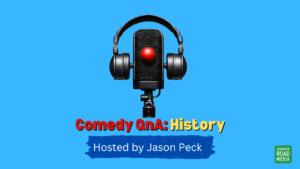Yes, there’s those words again – “public speaking”. You might be like me when I used to hear those words, I used to think:
“what on earth is public speaking?”
You see, my background is as an actor and a comedian; so technically I do public speaking already. Don’t I? hmm…
So I decided to do a little bit of investigation from my desk… don’t ya just love the web?
Basically public speaking is not necessarily just talking to the general public. It’s a separate entity fromacting and stand-up comedy. Public speaking covers delivering speeches or presentations in business meetings, giving speeches at weddings or funerals as well as the inspirational and motivational speeches of people like Tony Robbins and Zig Ziglar.
Ah-ha, so now we’re getting somewhere!
In my mind public speaking can sit nicely alongside stand-up comedy. Now I say that, but I don’t want anybody to be put off public speaking because you think you have to be funny.
You don’t.
What I mean is that fundamentally stand-up comedy involves you standing before an audience as yourself and speaking to them in your own speaking rhythm. The same as public speaking.
The difference between public speaking and stand-up is with speaking you’re not required to be funny. If you are funny, though, then that’s an added bonus. But you don’t have to get the same amount of laughs as a comedian does.
First of all I’d get hold of a copy of Instant Speaking Success by Paul Evans. I have found this product invaluable and will talk about it more in later posts.
A good place to start your public speaking career, or to get practise for giving a talk in your job, is to go along to a Toastmasters public speaking club. This link goes straight to their website and allows you to search for your nearest club 🙂
Quick bit of history: “Toastmasters was established in the U.S. and has been around since 1924. It’s now an international organisation”. Here endeth the lesson.
There are two things that you can do at a Toastmasters club. The first is to find as many Toastmasters clubs near you, go along and participate in the “Table Topics” part of the evening.
This entails a more experienced member coming up with a topic which fellow members and guests (which you would be unless you were a member) can be called upon to talk off-the-cuff for up to a minute-and-a-half.
Unlike a comedy club, you will get constructive and supportive feedback as well as suggestions for improvement from fellow members.
This is very useful if you have a one off speech or a couple of speeches that you know that you have to give.
By doing this you gain valuable “stage time” in front of a friendly crowd, which allows you to develop your confidence and natural speaking delivery.
The second thing you could do, is what I did, is if you find that you enjoy the experience then you can become a member.
They have a beginner’s manual that assigns ten speeches which you can usually complete over the course of a year or so. It can take that long or longer because obviously there are other members wanting to do speeches and you should probably leave about a month or so between each speech you write.Also, it depends on how much time you can dedicate to it.
Each assignment focuses on different skills such as structure, vocal variety and use of gestures and so on. Once you complete your first 10 speeches you gain a “Competent Communicator” (CC) award which is an internationally recognised achievement.
You also have the option to become a “Competent Leader” (CL) at the same time by undertaking a different series of assignments.
If you achieve a CC status you have the option to progress further with a series of Advanced Manuals some of which deal with “Speeches By Management”, “Technical Presentations” and “Special Occasion Speeches”.
It is worth noting that you can only take part in speeches and earn your CC award if you become a member.
Not only that but they also have various competitions which you can participate in such as a Humorous Speech contest (useful for our needs), a Table Topics Contest and an International Contest (but you have to be a member in order to participate).
There are also a number of well-known Toastmasters that include actor and comedian Tim Allen, best-selling author Napoleon Hill and former
U.S. astronaut Jim Lovell.
For more information about Toastmasters use the following link:http://www.toastmasters.org/
The downside to Toastmasters is that it can often be full of people who are not professional speakers, therefore it can often come across as “by amateurs for amatuers”.
That said there are usually some very experienced Toastmasters in each club, who have seen enough speakers and have been involved in speaking for their job. These people need to be sought out as their advice can be like gold.
Even though the Toastmasters Competant Communicator manual helps you learn how to structure speeches, I found that Paul Evans’ book Instant Speaking Success really helped with getting the detail of a speech.



